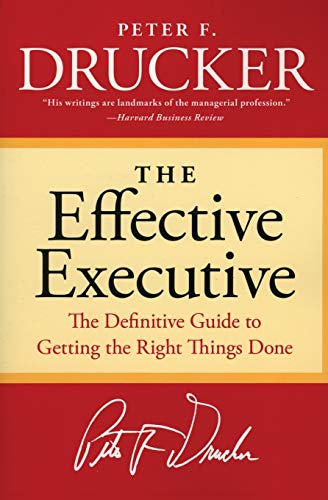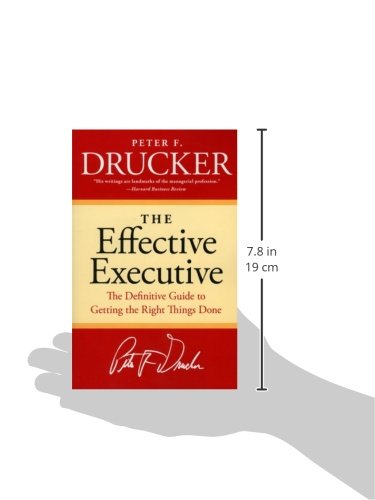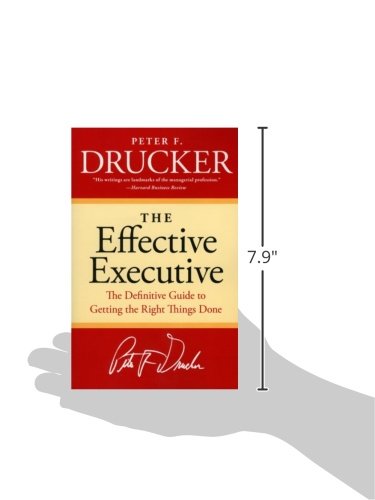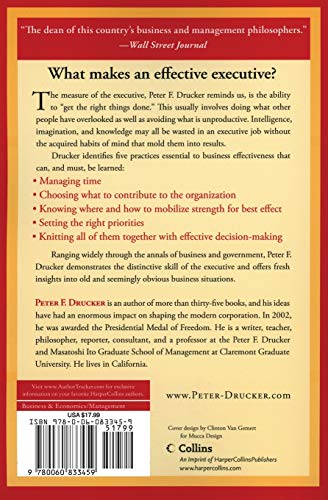The Effective Executive: The Definitive Guide to Getting the Right Things Done (Harperbusiness Essentials)
Verfügbarkeit für Abholungen konnte nicht geladen werden
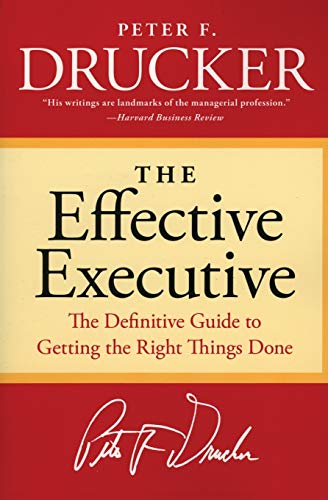
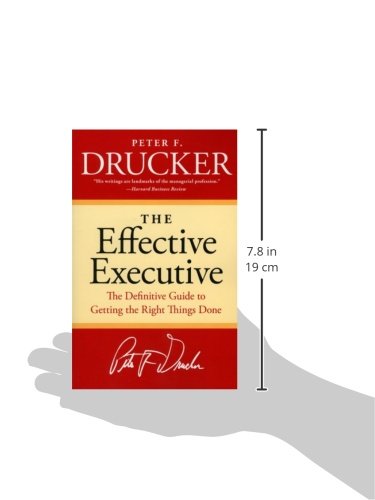
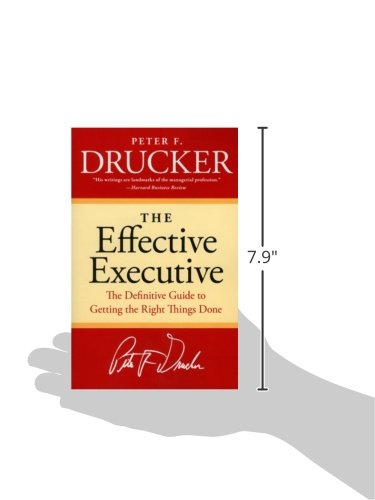
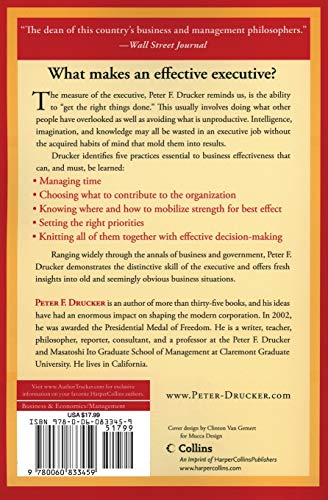
Versand & Rücksendungen
Versandrichtlinien
Bestellbearbeitungszeiten: Die Lieferzeiten für bestimmte Produkte können variieren und sind unten aufgeführt.
Print on Demand: Einige Produkte werden mit „Print on Demand“ erstellt. Das heißt, sobald Sie Ihre Bestellung aufgegeben haben, werden die Produkte produziert und versendet.
Derzeit gilt Print on Demand für Produkte in den folgenden Kategorien:
Bekleidung: Auftragsbearbeitungszeit: 5–7 Werktage
Schmuck: Bearbeitungszeit der Bestellung: 14–21 Tage
Haushaltsprodukte der Marke GIN: Bearbeitungszeit der Bestellung: 5–10 Werktage
Büro und Schreibwaren: Auftragsbearbeitungszeit: 5–10 Werktage
Andere allgemeine Bestellungen: Die meisten anderen Bestellungen im GIN Store haben eine Bearbeitungszeit von 2-4 Werktagen. Andere Faktoren können diesen Zeitrahmen verlängern, wie Saison, Wetter, unvorhergesehene Herausforderungen usw. Wir werden alle angemessenen Anstrengungen unternehmen, um Sie bezüglich verlängerter Versandzeiträume mit Ihrer Bestellung zu kontaktieren.
Mehrere Sendungen:
Bitte beachten Sie, dass einige Produkte von mehreren Standorten und Anbietern geliefert werden. Daher erhalten Sie Ihre Bestellung möglicherweise in mehreren Sendungen, falls Ihre Bestellung mehrere Artikel enthält.
Versandarten:
Es stehen mehrere Versandmethoden zur Verfügung. Der GIN Store behält sich nach eigenem Ermessen das Recht vor, eine alternative Versandmethode mit gleichem oder höherem Serviceniveau zu verwenden. Es werden angemessene Anstrengungen unternommen, um Kunden über Umstände zu informieren, die besondere Versandvorkehrungen erfordern.
Lieferung:
WICHTIGER HAFTUNGSAUSSCHLUSS für Bestellungen, die AUSSERHALB der Vereinigten Staaten von Amerika versandt werden: Zölle und Steuern: Einfuhrzölle, Steuern und Maklergebühren sind nicht im Produktpreis oder den Versand- und Bearbeitungskosten enthalten. Diese Gebühren liegen in der Verantwortung des Käufers, da wir nur die Transportgebühr für Ihre Bestellung berechnen.
Affiliate-Bestellungen: Um GIN-Mitgliedern erweiterte Produktoptionen anzubieten, haben wir Partnerschaften mit externen Anbietern als Affiliates geschlossen. Bestellungen, die über eine Partner-Website aufgegeben werden, unterliegen den Versand- und Rückgaberichtlinien dieser Website. Wir empfehlen Ihnen, vor dem Kauf alle Richtlinien von Partner-Websites zu lesen.
Auf dem Transportweg verloren: Wenn Ihre Bestellung nicht eingetroffen ist und Ihre Sendungsverfolgungsinformationen anzeigen, dass das Paket zugestellt wurde, kontaktieren Sie uns bitte so schnell wie möglich. In einigen Fällen geht das Paket beim Transport durch den Spediteur verloren. Manchmal gibt es Pakete, die nach einer Umleitung auftauchen, sich aufgrund des Wetters verzögern oder an das Haus eines Nachbarn geliefert werden usw. Wenn eine dieser Situationen eintritt, werden wir uns bemühen, die verlorene Sendung mit Ihnen zu beheben.
Versandziel: Wir empfehlen Ihnen, Ihre Bestellung an eine Wohnadresse zu senden, um sich vor Verlegung oder falscher Handhabung Ihrer Bestellung durch Dritte zu schützen. Der GIN Store kann keine Ansprüche auf verlorene Pakete geltend machen, die an eine Nicht-Wohnadresse gesendet wurden, die die Lieferung über die Sendungsverfolgungsnummer anzeigen.
Unzustellbare oder zurückgesendete Pakete: Wenn Ihre Sendung aufgrund falscher Adresse, eingeschränkter Adresse, nicht unterstützter Adresse (Postfach für UPS-Sendung angegeben oder Artikel zu groß für Postfach usw.) nicht zustellbar ist, zu viele gescheiterte Zustellversuche oder Ablehnung durch den Empfänger, werden wir Sie wegen alternativer Versandmodalitäten kontaktieren. Aus diesen Gründen entstehender zusätzlicher Versand geht zu Lasten des Kunden.
Rückgabe-/Erstattungsrichtlinie
Falsche, beschädigte, verlorene oder defekte Artikel:
Falsche Artikel: Wenn Sie falsche Waren erhalten haben, z. B. Artikel, die nicht mit Ihrer Bestellung übereinstimmen, haben Sie Anspruch auf eine Rückerstattung oder einen Umtausch gegen die richtigen Waren.
Beschädigte Artikel: Wenn Sie ein beschädigtes oder defektes Produkt erhalten haben, haben Sie Anspruch auf eine Rückerstattung oder einen Umtausch für dasselbe Produkt, um Ihre beschädigte Ware zu ersetzen.
- Wenn Ihre Bestellung eine Abweichung aufweist oder Sie sie in einem beschädigten Zustand erhalten haben, muss dies innerhalb von 10 Werktagen nach Erhalt gemeldet werden, um Anspruch auf Regress zu haben
Auf dem Transportweg verloren: Bestellungen, die auf dem Transportweg verloren gehen, können in der Regel erstattet werden, aber diese Bestellungen unterliegen auch den Versandrichtlinien von The GIN Store.
Auf Anfrage erstellte Produkte:
Viele Artikel im GIN Store werden per „Print on Demand“ erstellt. Das heißt, sobald Sie Ihre Bestellung aufgegeben haben, werden die Produkte produziert und versendet. Diese Artikel sind nicht erstattungsfähig, außer im Falle eines falschen Produkts, eines beschädigten Produkts, eines Transportverlusts oder eines defekten Produkts.
Derzeit betrifft dies Produkte in den folgenden Kategorien:
- Kleidung
- Schmuck
- Haushaltsprodukte der Marke GIN
- Büro und Schreibwaren
Andere Bedingungen:
- Um die Sicherheit und Integrität unserer Produkte zu gewährleisten, akzeptiert The GIN Store keine Rücksendungen von Nahrungsergänzungsmitteln, Reinigungsmitteln, homöopathischen Produkten oder anderen Gegenständen, die für den menschlichen oder tierischen Verzehr bestimmt sind. Alle Verkäufe von Produkten in diesen Kategorien sind endgültig.
- Jede Bank und jedes Finanzinstitut ist anders und abhängig von Ihrem Rücken müssen Sie möglicherweise ] bis zu 10 Werktage für die Bearbeitung Ihrer Rückerstattung einplanen.
Rückgabeautorisierung: Jede Rückerstattung oder jeder Umtausch muss vom GIN Store Kundenservice vorautorisiert werden. Um eine Vorautorisierung anzufordern, kontaktieren Sie uns unter: support@theginstore.com.
GIN Store Erfahrung:
Wir möchten alles tun, um sicherzustellen, dass Sie mit Ihrem Kauf zufrieden sind, damit Sie uns jederzeit kontaktieren können, und wir werden daran arbeiten, dass Sie sich „JETZT GUT FÜHLEN“ und die bestmögliche Betreuung und das bestmögliche Einkaufserlebnis erhalten.
Zuletzt geändert am 31.05.2022
.Author: Drucker, Peter F.
Brand: HarperBusiness
Edition: Revised
Features:
- HarperCollins Publishers
Binding: Paperback
Number Of Pages: 208
Release Date: 03-01-2006
Part Number: 9780060833459
Details: Product Description What makes an effective executive? The measure of the executive, Peter F. Drucker reminds us, is the ability to "get the right things done." This usually involves doing what other people have overlooked as well as avoiding what is unproductive. Intelligence, imagination, and knowledge may all be wasted in an executive job without the acquired habits of mind that mold them into results.Drucker identifies five practices essential to business effectiveness that can, and must, be learned: Managing time Choosing what to contribute to the organization Knowing where and how to mobilize strength for best effect Setting the right priorities Knitting all of them together with effective decision-making Ranging widely through the annals of business and government, Peter F. Drucker demonstrates the distinctive skill of the executive and offers fresh insights into old and seemingly obvious business situations. About the Author Peter F. Drucker is considered the most influential management thinker ever. The author of more than twenty-five books, his ideas have had an enormous impact on shaping the modern corporation. Drucker passed away in 2005. Excerpt. © Reprinted by permission. All rights reserved. The Effective Executive The Definitive Guide to Getting the Right Things Done By Peter F. Drucker HarperCollins Publishers, Inc. Copyright © 2006 Peter F. DruckerAll right reserved. ISBN: 0060833459 Chapter One Effectiveness Can Be Learned To be, effective is the job of the executive. "To effect" and "to execute" are, after all, near-synonyms. Whether he works in a business or in a hospital, in a government agency or in a labor union, in a university or in the army, the executive is, first of all, expected to get the right things done. And this is simply that he is expected to be effective. Yet men of high effectiveness are conspicuous by their absence in executive jobs. High intelligence is common enough among executives. Imagination is far from rare. The level of knowledge tends to be high. But there seems to be little correlation between a man's effectiveness and his intelligence, his imagination or his knowledge. Brilliant men are often strikingly ineffectual; they fail to realize that the brilliant insight is not by itself achievement. They never have learned that insights become effectiveness only through hard systematic work. Conversely, in every organization there are some highly effective plodders. While others rush around in the frenzy and busyness which very bright people so often confuse with "creativity," the plodder puts one foot in front of the other and gets there like the tortoise in the old fable. Intelligence, imagination, and knowledge are essential resources, but only effectiveness converts them into results. By themselves, they only set limits to what can be attained. Why We Need Effective Executives All this should be obvious. But why then has so little attention been paid to effectiveness, in an age in which there are mountains of books and articles on every other aspect of the executive's tasks? One reason for this neglect is that effectiveness is the specific technology of the knowledge worker within an organization. Until recently, there was no more than a handful of these around. For manual work, we need only efficiency; that is, the ability to do things right rather than the ability to get the right things done. The manual worker can always be judged in terms of the quantity and quality of a definable and discrete output, such as a pair of shoes. We have learned how to measure efficiency and how to define quality in manual work during the last hundred years-to the point where we have been able to multiply the output of the individual worker tremendously. Formerly, the manual worker-whether machine operator or front-line soldier-predominated in an organizations. Few people of effectiveness were needed: those at the top who gave the orders that others
EAN: 9780060833459
Package Dimensions: 7.9 x 5.3 x 0.7 inches
Languages: English
Haftungsausschluss: Während wir daran arbeiten sicherzustellen, dass die Produktinformationen korrekt sind, können Hersteller gelegentlich ihre Produktbeschreibungen und/oder Zutatenlisten ändern. Tatsächliche Produktverpackungen und -materialien können mehr und/oder andere Informationen enthalten, als auf unserer Website angezeigt werden. Wir empfehlen, dass Sie sich nicht nur auf die präsentierten Informationen verlassen und dass Sie immer Etiketten, Warnungen und Anweisungen lesen, bevor Sie ein Produkt konsumieren. Alle Gesundheitsinformationen in dieser Produktbeschreibung dienen nur zu Informationszwecken. Wir bieten keine medizinische Beratung, Diagnose oder Behandlung an. Diese Informationen sollen keinen professionellen medizinischen Rat ersetzen oder ersetzen. Keine Angaben in dieser Beschreibung wurden von der Food and Drug Administration bewertet. Das hier beschriebene Produkt ist nicht zur Diagnose, Behandlung, Heilung oder Vorbeugung von Krankheiten bestimmt.
- Die Auswahl einer Auswahl führt zu einer vollständigen Seitenaktualisierung.

